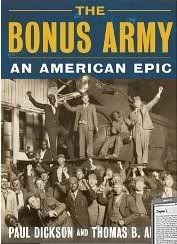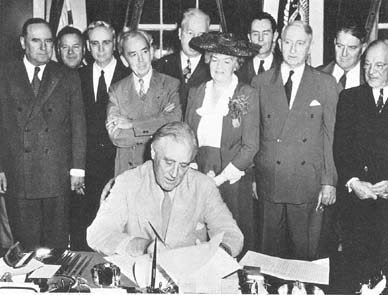 There was an old Hoover
There was an old HooverWho lived in a show.
He had so many veterans
He didn't know what to do.
So he gassed them and tanked them,
And burned up their beds
And then told all the people
The vets were all Reds.
-Bonus Expeditionary Force News, September 17, 1932
*****
Most stories start off slowly, build to a climax, and end with a quick resolution. The story of the Bonus Army, on the other hand, is the reverse. Most of the real "action" took place in 1932, shortly after the movement began that same year.
The end of the story didn't really come until 1936, when bonds were issued to provide compensation to World War I veterans. The Bonus Army chronicles their journey from their first efforts in the 1920s to the establishment of the G.I. Bill of Rights in 1944.
Along the way, there are heroes, villains, and those in between. D.C. police chief Glassford, a veteran himself, sacrificed hundreds of dollars of his own money to feed the small city of veterans when the federal government refused.
Representative Edith Nourse Rogers challenged the Roosevelt administration to give the truth of the Labor Day Hurricane of 1935, which through managerial negligence killed hundreds of federally employed veterans in the Florida .
On the other side is Army Chief of Staff Douglas MacArthur, who collected faulty intelligence alleging thorough communist infiltration of the Bonus Army and exceed presidential orders by evicting veterans and their families from the Anacostia Flats. (It would not be the last time he time he would ignore a president's orders.)
And John E. Rankin, Chairman of the Committee of Veterans' Affairs and outspoken supporter of segregation, refused to endorse the G.I. Bill because of its equal treatment of blacks soldiers. His decision to hold up benefits for white veterens purely out of rascism surprised me. At the signing of the bill, despite his objections, he stood with his arms crossed.

Most interesting is President Hoover, who became thoroughly reviled during his presidency for not doing enough to alleviate the impact of the Depression. To me he seems more of a tragic figure -- a successful and hard-working bureaucrat who simply could not overcome the traditional limitations of his position.
Contrary to the sympathetic public, he came to adopt MacArthur's view that the group was heavily infiltrated by communist agitators and a threat to democracy. Yet therein lies the greater issue: at what point does First Amendment "right to petition the government for a redress of grievances" become mob rule?
There is also the question: "What does a civilized society owe to those who fight for it, particularly those who are drafted?" Do we owe only the disabled? What about those who come back without a scratch, or those who didn't deploy overseas but still served?
The benefits I enjoy today are a direct result of the Bonus Army's efforts to address those questions. Despite the difficulties these days involving multiple deployments, the legacy of the Bonus Army reminds me to be grateful that I'm in the Army.
In retrospect, the Bonus March
Representative John E. Rankin

No comments:
Post a Comment